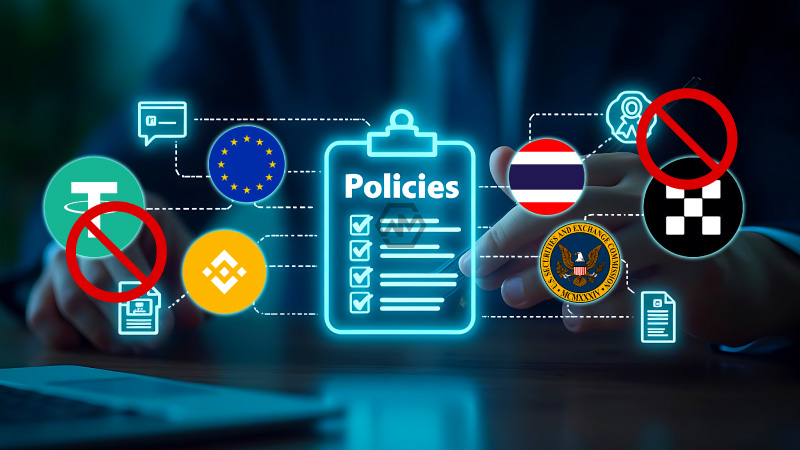- Binance halts USDT spot trading in Europe to comply with MiCA regulations.
- Thailand’s SEC sues OKX for operating without a license, targeting nine promoters.
- Global regulators tighten oversight, urging investors to verify exchange legitimacy.
The European Union’s Markets in Crypto-Assets (MiCA) regulation is reshaping how major crypto exchanges operate. Binance, in response to MiCA’s compliance mandates, has removed Tether (USDT) spot trading pairs in the European Economic Area.
Meanwhile, in Thailand, OKX is under fire for allegedly running an unlicensed crypto exchange. The Thai SEC has not only filed a lawsuit against OKX but also charged nine individuals who promoted the platform on social media.
Crypto Exchanges Under Fire: Binance and OKX Face Legal Hurdles
Binance’s decision to remove USDT spot trading in Europe stems from MiCA’s regulatory framework, which aims to standardize the crypto market and reduce risks. This move aligns with the exchange’s broader compliance strategy to ensure continued operations in the European Economic Area. The transition will be fully implemented by early 2025, marking a significant shift in stablecoin accessibility within the region.
Kraken had already taken similar action, removing various stablecoins, including USDT and PayPal USD, from its platform. These regulatory changes are not just affecting major exchanges but also the wider crypto ecosystem. Investors are now forced to adjust their strategies as stablecoin trading options become increasingly restricted under MiCA.
In Thailand, OKX faces legal action for operating without the necessary approvals under the country’s 2018 Digital Asset Decree. The charges extend beyond the exchange itself, as authorities are also prosecuting nine individuals who allegedly helped promote the platform online. The case raises concerns about the role of influencers in marketing crypto services and their accountability in regulatory compliance.
Beyond Thailand, the crackdown on crypto platforms continues worldwide. OKX is expanding into regulated markets like Europe, recently obtaining a MiFID II license while awaiting approval in Malta. The global push for compliance underscores the fine line between fostering innovation and enforcing financial stability in the digital asset industry.
The tightening regulatory landscape signals a shift toward more structured oversight in the crypto space. As governments enforce stricter rules, exchanges must adapt or risk exclusion from key markets.
“Regulation is necessary, but it must not stifle innovation.” – Christine Lagarde



